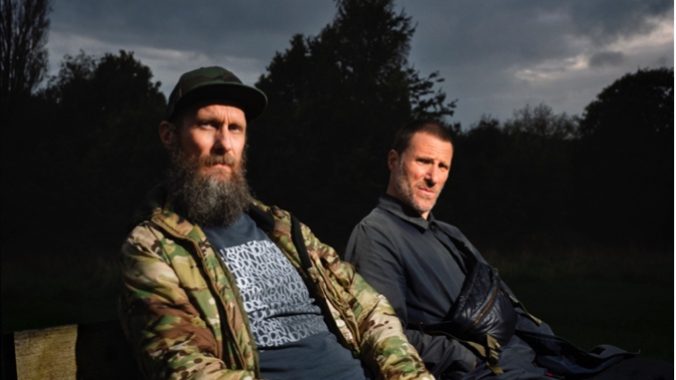On UK GRIM Sleaford Mods Prove Their Angriest Days Aren’t Behind Them
The influential post-punk duo share the aggravations that inspired their 12th album
Photo by Ewen Spencer
Like having the genetic trait of uncontrollable perspiration at the faintest hint of spice, as much as some people try not to sweat the small stuff as they grow older, it’s impossible to ignore the urge to flip a table when they detect bullshit. For the highly influential Nottingham post-punk and electronic duo Sleaford Mods, their infectious brand of anger isn’t necessarily a default setting, but it’s a feeling they’ve learned how to tap into.
This year marks the 10-year anniversary of their sixth full-length Austerity Dogs which set the table for their international acclaim the following year with their breakthrough Divide and Exit. Both albums presented the one-of-a-kind vocalist Jason Williamson’s agitated working-class poetry and the inventive-yet-sparse beats of producer Andrew Fearn as a thrilling new direction for post-punk. With their 12th album UK GRIM, Williamson and Fearn have delivered an album that recaptures that unbridled fury while pointing towards an evolution in their sound. “You’d think that the angriest stuff is behind you, but clearly not,” laughs Williamson as the three of us connect over zoom.
The two started writing the songs that would eventually become UK GRIM in March of 2021 just before setting out for their Spring tour supporting their Spare Ribs, their highest charting album to date. That album provided such an of-the-moment understanding of what we were all going through during heavy periods of lockdown and isolation. Like on Spare Ribs, Williamson’s writing on this new album is a continuation of that he aggression felt towards the complete breakdown of UK society at the hands of its bumbling government and taking aim at the new order of the world now that we are being told to live our normal lives again. “As society opened up again, the world started to work as it did before,” Williamson explains, “So [the album] kind of discusses all of those things that came out after that which was mainly aggression, pettiness, paranoia, anxiety. All these things are rolled into the energies on UK GRIM. A failing government. A complete catastrophe of a collection of people governing the country. All of these things melted in there.”
Those in high offices instructing the masses to behave, and those who put their faith in elected officials to have their best interests in mind expecting a better way of life if they stay the course, that’s been a power struggle that Williamson has mined for the majority of the group’s run. As we now depend on our governments to put the pieces back together, he was saddened and angered to see that the charlatans in charge didn’t grow a conscience in the face of adversity, rather they just found a new way to line their pockets from the safety of their elected titles. “It really did show the the conning of some of these people or the lack of care they showed for the people they were supposed to be governing,” he says with a heavy sigh. “It showed a lot of people for the careerists that they are.”
His frequently hilarious and justified lashing out towards the higher powers has become expected with each new Mods release, but Williamson has also never shied away from taking down a different kind of nefarious hierarchy: the posturing infiltrators in the underground music scene, which he believes has only gotten worse as the live music infrastructure has returned. On the new song “D.I.Why,” he offers a litany of “reasons why” he says, “death to your D.I.Y.” He portrays a new slew of unorginal post-punk poseurs seeing the unexpected success of Williamson’s Sprechstimme singing approach and trying to copy it without a shred of his personality or anything close to his unique worldview. In his eyes, the majority of these new bands are just trying to make an “edgy version of something shit.” In a funny anectdote within the song, he sees a doctor to sort out his animosity towards these “BnM Goths” and “post-punk dross” only to have the doctor confirm that they deserved to all be slapped. It would almost be like a post-punk re-telling of the great sad clown Pagliacci’s story if the group’s influence wasn’t so easily traced to so many new bands enjoying wild successes today. While he believes there are many bands working within this kind of blueprint created by artists like The Fall and Nick Cave, Williamson believes the door has been left open for others to water down the richness of the sauce.
“People are holding on to a movement that I think has become just as stale as the commercial side of things,” he says, “It’s no longer this playground for masses of original ideas because everyone’s become amalgamated into the same uniform, same hair color, same tattoos. The ideology is roughly the same, lots of naivety. Which I wouldn’t attribute to creative progressions. Obviously, there are people in that environment that are very good and are very true to what they believe, without a doubt, of course, but I think it’s worth noting that there isn’t as well.”
-

-

-

-

-

-

-

-

-

-

-

-

-

-

-

-

-

-

-

-

-

-

-

-

-

-

-

-

-

-

-

-

-

-

-

-

-

-

-

-








































